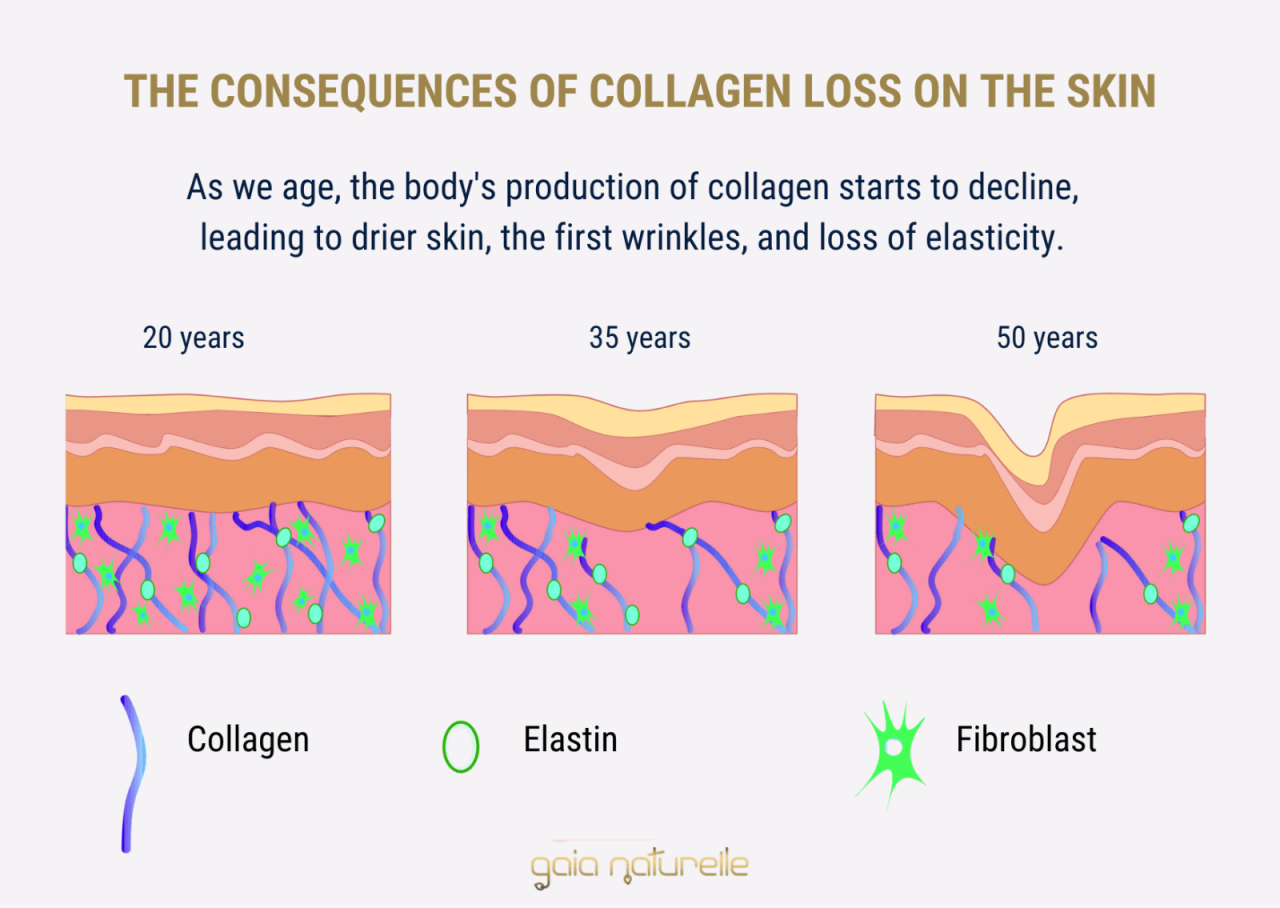Is collagen effective for weight loss and muscle building – Is collagen effective for weight loss and muscle building? That’s the million-dollar question, or perhaps the million-dollar
-supplement* question! We’re diving headfirst into the swirling vortex of collagen claims, separating fact from fiction, and exploring whether this protein powerhouse can truly help you sculpt your dream physique. Prepare for a journey through scientific studies, anecdotal evidence, and maybe even a few collagen-fueled jokes along the way.
Get ready to discover if collagen is the secret ingredient to your fitness success or just another hyped-up health trend.
This exploration will cover everything from collagen’s role in satiety and metabolism to its potential impact on muscle protein synthesis and joint health. We’ll examine different types of collagen, optimal dosages, and how to incorporate collagen into a balanced fitness plan. We’ll also address common misconceptions and provide answers to frequently asked questions, ensuring you’re armed with the knowledge to make informed decisions about adding collagen to your routine.
Collagen’s Role in Weight Management
Collagen, the body’s most abundant protein, plays a surprisingly multifaceted role beyond just skin elasticity. While not a miracle weight-loss solution, its influence on satiety, metabolism, and even indirectly, body composition, warrants exploration. Let’s delve into the intriguing connection between collagen and your weight.
Collagen and Satiety
Emerging research suggests that collagen peptides, due to their high protein content, can promote a feeling of fullness. This increased satiety can contribute to reduced calorie intake, potentially aiding in weight management. The slow digestion of collagen compared to other proteins may play a role in this prolonged satiety effect. Think of it as a gentle, protein-powered hug for your stomach, keeping those hunger pangs at bay.
Collagen’s Impact on Metabolism

While direct effects on metabolism are still under investigation, some studies hint at collagen’s potential to support metabolic processes. A healthy metabolism is crucial for efficient calorie burning, and maintaining a balanced metabolism is key for weight management. The evidence is still preliminary, but the potential benefits are promising.
Collagen Supplementation vs. Other Weight-Loss Strategies, Is collagen effective for weight loss and muscle building
Collagen supplementation shouldn’t be viewed as a standalone weight-loss solution. It’s best used in conjunction with a balanced diet, regular exercise, and other healthy lifestyle choices. Think of it as a supportive player on your weight-management team, rather than the star quarterback. It complements, rather than replaces, established strategies like calorie restriction and increased physical activity.
Comparison of Collagen Types and Weight Effects
| Collagen Type | Potential Weight Management Effects | Other Benefits | Notes |
|---|---|---|---|
| Type I | Increased satiety, may support muscle growth | Skin health, hair strength | Most common type in supplements |
| Type II | Indirectly supports joint health, potentially aiding mobility for exercise | Joint health | Often found in cartilage supplements |
| Type III | Supports skin elasticity, may contribute to overall well-being | Skin health, wound healing | Often found alongside Type I |
| Type V | Limited research on weight management effects | Supports various tissues | Less commonly found in supplements |
Collagen and Muscle Growth
While collagen isn’t a direct muscle builder like whey protein, its role in supporting connective tissues and joint health can indirectly benefit muscle growth. Let’s explore this fascinating interplay.
Collagen’s Role in Muscle Protein Synthesis
Direct evidence of collagen stimulating muscle protein synthesis is limited. However, its contribution to joint health and overall bodily function is undeniable. Stronger joints and less pain allow for more intense and consistent workouts, which are crucial for muscle growth. It’s a supportive role, not a starring one.
Synergistic Effects with Resistance Training and Nutrition
Combining collagen supplementation with resistance training and a balanced diet, rich in protein and other essential nutrients, maximizes its potential benefits for muscle growth. Think of it as the perfect supporting cast for your fitness goals. It doesn’t build muscle on its own, but it creates the optimal environment for muscle growth to flourish.
Collagen’s Benefits for Joint Health and Indirect Impact on Muscle Building
Healthy joints are crucial for effective resistance training. Collagen supports joint health, reducing pain and inflammation, allowing for more intense and frequent workouts. This leads to greater muscle stimulation and, ultimately, more muscle growth. It’s the unsung hero of your fitness journey, quietly ensuring your workouts are effective and injury-free.
Workout Regimen Integrating Collagen Supplementation
- Warm-up (5-10 minutes)
- Resistance training (30-60 minutes, focusing on major muscle groups)
- Cool-down (5-10 minutes)
- Consume collagen supplement post-workout
- Rest and recovery (adequate sleep and nutrition)
Scientific Evidence and Studies

The scientific community is actively researching collagen’s effects on body composition. While the evidence is still emerging, several studies offer valuable insights, although limitations and biases need to be acknowledged.
Findings from Peer-Reviewed Studies
Several studies have shown a correlation between collagen supplementation and improved muscle recovery time, reduced joint pain, and potentially increased satiety. However, larger, more rigorous studies are needed to confirm these findings and establish definitive cause-and-effect relationships. The research is ongoing, but the early results are promising.
Limitations and Biases in Existing Research
Many studies are small-scale, with limited participant numbers and varying methodologies. Funding sources could also introduce bias. More robust, long-term studies with larger, more diverse populations are needed to draw conclusive conclusions about collagen’s impact on weight loss and muscle gain. The scientific community is working on it.
Summary of Key Findings
Current research suggests a potential role for collagen in supporting satiety, joint health, and potentially muscle recovery. However, more research is needed to definitively confirm its impact on weight loss and muscle growth. The picture is slowly becoming clearer, but further research is crucial.
Hypothetical Research Design
A well-designed study could involve a randomized controlled trial with a large, diverse population, comparing collagen supplementation to a placebo group, while controlling for diet and exercise. This would help isolate the effects of collagen and minimize confounding variables. This is a design that researchers are actively pursuing.
Types of Collagen and Their Effects
Different types of collagen possess unique properties, impacting their effectiveness for weight management and muscle building. Understanding these differences is crucial for informed supplementation.
Comparison of Collagen Types
Type I collagen is the most abundant and commonly used in supplements, often associated with skin and hair health. Type II collagen is prevalent in cartilage and may benefit joint health. Type III collagen supports skin elasticity and wound healing. Each type has a slightly different role in the body, impacting its potential benefits for weight and muscle.
Form of Collagen and its Absorption
Hydrolyzed collagen, also known as collagen peptides, is the most easily absorbed form due to its smaller molecular size. This enhanced bioavailability makes it more effective for the body to utilize for various purposes, including potential benefits for weight management and muscle recovery. It’s the efficient choice for your body.
Bioavailability and Absorption Rates
Hydrolyzed collagen boasts superior bioavailability compared to other forms. Its smaller peptide chains allow for easier absorption into the bloodstream, maximizing its utilization by the body. This superior absorption is a key factor in its effectiveness.
Structural Differences Between Collagen Types
Imagine collagen as a triple helix – a twisted rope made of three strands. Type I collagen has a thick, strong rope structure, ideal for providing strength to skin, bones, and tendons. Type II collagen has a slightly thinner, more flexible structure, better suited for the cushioning properties of cartilage. Type III collagen is a thinner, more delicate structure often found alongside Type I, providing support and elasticity.
Collagen Supplementation: Dosage and Considerations
Choosing the right dosage and understanding potential side effects are crucial for safe and effective collagen supplementation. Let’s discuss these important factors.
Recommended Collagen Dosage
Typical recommended dosages range from 10 to 40 grams per day, depending on individual needs and goals. It’s best to start with a lower dose and gradually increase it as tolerated. Consult a healthcare professional for personalized recommendations.
Potential Side Effects and Interactions
Collagen supplements are generally well-tolerated, but some individuals may experience mild side effects such as digestive upset. Interactions with certain medications are possible, so consulting a doctor is advisable, especially if you have pre-existing health conditions or are taking other medications.
Selecting a High-Quality Supplement
Look for supplements that are third-party tested for purity and potency, specifying the type and source of collagen. Choose reputable brands with transparent manufacturing practices. Investing in quality ensures you get what you pay for.
Factors Influencing Collagen Absorption
- Type of collagen (hydrolyzed is best)
- Dosage
- Individual gut health
- Consumption with vitamin C
Collagen in a Holistic Approach to Fitness

Collagen is just one piece of the fitness puzzle. It works best when integrated into a comprehensive plan encompassing diet, exercise, and recovery.
Collagen’s Role in a Comprehensive Fitness Plan
Collagen supports joint health, potentially aiding in consistent exercise. It can contribute to satiety, aiding in dietary adherence. Combined with adequate protein intake, it can support muscle recovery and growth. It’s a valuable tool in a holistic approach.
Complementing Other Dietary Strategies
Collagen complements other weight management strategies by potentially reducing hunger and supporting muscle maintenance. It doesn’t replace a balanced diet but works synergistically with it. It’s a helpful addition, not a replacement.
Importance of Balanced Diet and Protein Intake
A balanced diet rich in protein, fruits, vegetables, and whole grains provides the building blocks for muscle growth and overall health. Collagen supplements should be viewed as a complementary addition, not a replacement for a healthy diet. They work together, not independently.
Sample Meal Plan Incorporating Collagen

A sample meal plan could include a breakfast smoothie with collagen peptides, a lunch salad with chicken breast (a good source of protein), and a dinner of fish with vegetables. This incorporates collagen strategically into a balanced diet. It’s just an example, adjust to your needs.
Closing Summary: Is Collagen Effective For Weight Loss And Muscle Building
So, is collagen the miracle worker for weight loss and muscle building that some claim? The answer, like a perfectly sculpted six-pack, requires a multifaceted approach. While collagen alone won’t magically melt away fat or build muscle overnight, it can play a supporting role within a holistic fitness strategy. Think of it as a helpful teammate, not a solo superstar.
By understanding its potential benefits, considering its limitations, and integrating it thoughtfully into your diet and workout routine, you can harness the power of collagen to enhance your fitness journey. Now go forth and conquer your fitness goals – with or without the collagen, the choice is yours!
